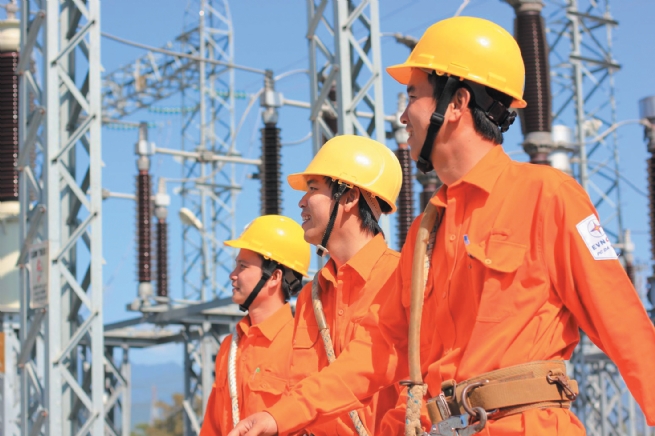11:27:21 AM | 5/23/2025
The 4.8% electricity price increase, which pushes the cumulative rise over three years beyond 17%, poses challenges for households and businesses while encouraging innovation and shared responsibility with the power sector for sustainable growth.

Price hikes are essential to sustain the power sector’s operations but pose the significant pressures on households and businesses
Rising cost pressures
Vietnam Electricity Group (EVN) Deputy General Director Vo Quang Lam said that the 4.8% price hike was carefully calibrated to balance soaring input costs such as imported coal, gas and oil in early 2025 against households’ and businesses’ affordability, while safeguarding economic competitiveness and social welfare. He emphasized that the decision factored in impacts on the Consumer Price Index (CPI) and the broader economy. Meanwhile, EVN Chairman Dang Hoang An noted that, despite a projected pre-tax profit of over VND4,100 billion by the end of 2024, the company still grapples with a cumulative loss exceeding VND47,000 billion from 2022-2023.
Yuanta Vietnam Securities Company said that frequent electricity price hikes reflect pressures from volatile fuel prices, exchange rates and EVN’s heavy financial losses. Despite recent drops in global fuel costs, rising expenses have forced the power sector to raise retail prices, shifting part of the burden to consumers and businesses.
EVN representatives acknowledged that price hikes are essential to sustain the power sector’s operations but recognized the significant pressures on households and businesses. The 4.8% increase was designed to minimize impact while calling for societal cooperation.
Tran Hoang Son, Market Strategy Director at VPBankS, noted that for 61% of households using less than 200 kWh/month, the additional cost is only about VND 13,800 per month. Even for high-consumption households (400-500 kWh/month), the cost increase ranges from VND 49,000 to VND 65,000, deemed “within acceptable limits.” However, he cautioned that rising gold and essential goods prices, as well as exchange rates, potentially affect demand, especially among low-income groups. He urged broader adoption of energy-efficient appliances to help offset the impact.
Vietnam aims for 8% GDP growth in 2025, heavily reliant on domestic consumption. The price hike offers a chance for citizens to adopt sustainable lifestyles alongside the power sector, reinforcing confidence in the government’s ability to keep inflation below 4.5%, despite public investment disbursement reaching only 15.88% of the plan by April 30, 2025.
Businesses, especially in steel, cement and chemicals, face significant cost pressures. Hoa Phat Group, despite generating over 90% of its own electricity, expects an additional VND28-30 billion annually for grid power. Supe Phosphate and Chemical Lam Thao Company, consuming 3.7 million kWh/month, projects a VND 4 billion annual cost increase, heavily impacting high-content NPK products. “We must optimize operations to maintain competitive pricing,” said Tran Dai Nghia, Deputy General Director of Supe Lam Thao.
SKD Vietnam Precision Mechanics Company, where electricity accounts for 20-30% of product costs, is also affected. “We’re upgrading production lines, but investing in new technology is a major challenge,” said Director Nguyen Van Ket. Both SKD and Supe Lam Thao have implemented the ISO 50001:2018 energy management system, digitized operations with PMS software, and installed three-phase inverters, high-efficiency motors and LED lighting, cutting electricity consumption by 5–7%. “These are essential steps, though they don’t fully offset the cost increase,” Nghia noted.
Adaptation opportunities for businesses
Assoc. Prof. Ngo Tri Long, former Deputy Director of the Market Price Research Institute, called the price hike a “wake-up call” for businesses to review their value chains. Despite challenges, it presents opportunities to innovate technology and boost efficiency with state policy support.
However, he stressed that EVN must transparently disclose production costs by power source to enable public and business oversight. He advocated phasing out cross-subsidization mechanisms and accelerating a competitive electricity market to promote clean energy.
The price increase benefits the power and construction sectors. Yuanta Vietnam assessed that EVN’s improved cash flow will support power generation firms like GEG and REE, accelerating source and grid projects. The power sector is striving to ensure a stable supply, laying the groundwork for growth.
On inflation, with a 3% weight in the CPI basket, the price hike will raise 2025 CPI by just 0.07-0.10 percentage points, within control targets. Yet, Dr. Nguyen Tien Thoa, Chairman of the Vietnam Valuation Association, warned: “Electricity price hikes could trigger unwarranted price increases in other goods.” He recommended mandating transparent price listings before and after adjustments, with strict monitoring and penalties for unjustified hikes.
Experts view the price hike as both a challenge and a catalyst for coordinated action toward sustainability. Households are encouraged to use energy-efficient devices and adjust consumption habits to cut costs and protect the environment. Businesses should invest in energy-saving technologies, digitize management, and partner with renewable energy providers, with state support through preferential loans and tax reductions for smaller firms. EVN must reform internally, enhance cost transparency, prioritize low-cost sources like hydropower and renewables, and invest heavily in transmission infrastructure to reduce losses. Regulators should intensify market price oversight, develop a sustainable energy strategy, and foster a competitive electricity market for long-term growth.
“The electricity price hike is a call for households, businesses and the power sector to innovate together,” Ngo Tri Long affirmed. In the short term, shared responsibility is vital to sustain the energy system; in the long term, a transparent, competitive, and sustainable electricity market will enable Vietnam to maintain economic growth while balancing community interests.
By Huong Ly, Vietnam Business Forum